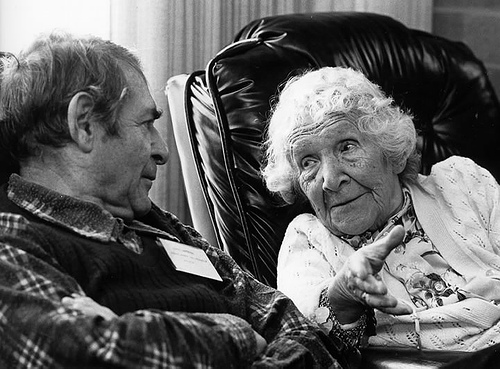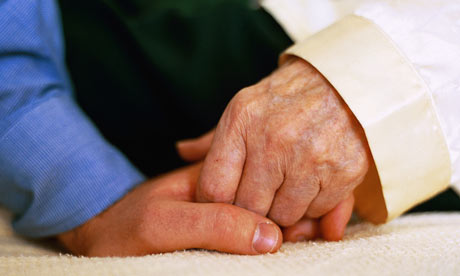|
VERA, aged 71, is a lifelong member of her church, in Birmingham. She is angry that the Church seems preoccupied with the young. “It’s almost if we do not exist,” she says. While many churches focus on attracting younger congregations in the effort to rejuvenate an ageing Church, it is also possible to miss the many opportunities there are to help older people find or grow in faith. Old age can be a “second flowering”, in which time is given to the exploration of the self in relationship to God, to others, and the world — factors that, arguably, make older people the Church’s natural spiritual constituency. In old age, there is often a desire to come to terms with, make sense of, and interpret one’s life-story. And a reassessment of the meaning of love and work, as well as the shaping of a religious outlook, can be a result of the soul-searching that occurs in mid and later life. |
|
This experience of reassessment has been important to 66-year-old Roger, who retired early and has made time for the church a priority. Making provision for the care of older people has been one way that his church in Northampton has been able to care for him, and others, as they age. “I am part of a small group at our church that meets, each month, to reflect on our life, after food and prayer. As we have grown in trust, we have been more ready to share some of the gaps, challenges, and hurts,” he says. As well as running prayer groups for older members of the congregation, some churches have found a surprising amount of opportunity to work in care homes and nursing homes to provide prayer groups, or occasional services for residents on site. In Eastbourne, in East Sussex, volunteers from churches in the town work together under the umbrella of a charity, Pastoral Action in Residential Care Homes for the Elderly (PARCHE), to provide services in more than 70 care homes in the area. PARCHE also offers practical advice, resources, and training to help churches in other parts of the country set up a similar ministry. Ruth, aged 68, is part of a monthly prayer-group that her church helps run in the care home where she now lives, in Wales. She acknowledges the part that the group plays in sustaining and deepening the spiritual lives of the people who attend, and — much like Roger’s experience — says that members of the group often reflect on their past lives in prayer. “Looking back at the journey taken becomes a prayer of reminiscence. It gives rise to times of puzzlement, of regret, and often of compunction.” THE passage into later life also often brings with it the need to learn appropriate ways of retaining elements of one’s past life, while accepting the fact of ageing and acting accordingly. This includes coming to terms with limitations, and a deeper consideration of one’s mortality. The Revd Ian Hunter, aged 90, lives with his wife, Peggy, aged 87,at the College of St Barnabas, in Surrey. “We’ve learnt it’s important to be realistic about things as you get older. When you retire, you don’t think about not being able to do simple things. You think you’ll be able to manage, which is stupid, really. “Moving into a home means living in community, and that takes some getting used to. But I’ve been quite glad to slow down. I sometimes felt that I was busier after retiring than I was before.” Peggy has also made adjustments, but has found that faith helped her to face these changes. “I was active all my life, but I can’t even make a cup of tea now, or really hold anything. It’s difficult, having to give things up, and to know that you’re never going to be physically as you once were. But faith is a great comfort.” Ninety-one-year-old Mary agrees. “The challenge is to face the inevitability of ageing, while allowing it to be energised by the youth which remains within.” She believes churches should encourage people to “welcome the growing inner power which comes from God” in facing the challenges of old age. Many people experience an urge to be creative as they age: to spill out feelings such as enjoyment, pain, or confusion in poetry or painting. This has particularly helped Susan, aged 84: “My second church is the library and community centre, where I have learnt to paint.” |
|
Being able to explore things creatively has been such a releasefor Susan that she is now looking at ways in which she can build links between her church and various creative groups in her community that work with the elderly. At St Stephen’s, Twickenham,arts and crafts are included in a weekly programme of events for older people that also includes lunch clubs, chairobics with a qualified physiotherapist, and a midweek healing and encouragement service. The church employs someone to co-ordinate and deliver this work among older people. THE coming of senescence, a gentler term than ageing, is usually the time to hand over to younger generations some of the responsibilities assumed in midlife. Although many older men and women still play an important part in business, politics, and the intellectual world, bringing to it the fruit of their experience, for most there is a call to reduce the burden of involvement. Late adulthood can remain a time of fulfilment, but often this will be found through working out a different relationship to society and to oneself — and it is not always easy to face this change. Churches with older members have to take care in the area of responsibilities: older age can be a time when people volunteer for positions that interest them, but, equally, may be a time when some may wish, or need, to set down responsibilities. “I’d love to give up being churchwarden after 22 years, but there is no one else to take my place,” 78-year-old Lawrence says. To avoid the feeling of compulsion requires regular communication. In facing the change of life and responsibilities, helping elderly people to recall pleasant memories through prayer or creative activities can be enormously helpful in aiding a sense of well-being, peace, and satisfaction. In later years, when self-esteem can be threatened, strength can be gained from recalling times when expressions of respect and love were given. People can feel stronger, too, by appreciating the many different ways in which they have contributed. As they recall these things, they can be inspired by new ways they can contribute — through prayer, or financial giving, for example — when hands-on help is no longer possible. FOR some older people, there are challenging practical considerations. The decision to move into a care home can be difficult, particularly when so much of one’s life and identity has been tied to a particular house or area. Once in a care home, the need to adjust to community life can also be a struggle, while the sense of abandonment and narrowing of horizons that some experience can leave elderly residents feeling distressed. The need for sensitive pastoral care in these situations is vital. In fact, some older Christians have discovered a new lease of pastoral life through informal ministry to fellow residents struggling with this new phase in their lives.* OLDER age can often present the opportunity for a deeper personal spirituality, too. Younger people are often preoccupied with their side of prayer, but, with age, the realisation often comes that it is God’s side that really matters. To be open to receive God’s love and affirmation is a greater gift by far than striving to earn or express it. The mystery of the Trinity often becomes more central in the lives of older people. It can have special relevance for those struggling with isolation, or the pain of incapacity and dependence, as it is in the shared life and love of the Godhead that people can come to find their true home. The desire to radiate God’s love to those around them can become the focal point of Christian ageing. As a result, prayer, too, can become other-centred, and much-needed intercession made for various situations. “It is getting late for us. The sun of our life is on the decline. When it grows low on the horizon, and is ready to slip away, its fires deepens and it throws a stronger, richer light. May it be the same for us,” said an older friend. The challenge for older people as they journey with God is to trust that their ageing can perhaps be the most fruitful time of their life. It is perhaps the mature aged, rather than the young, who can become the prophets of our time, witnessing to a present pregnant with God’s possibilities, and pointing to a future filled with hope. |
First published in the Church Times 13 August 2010



